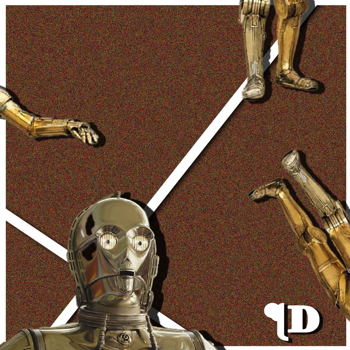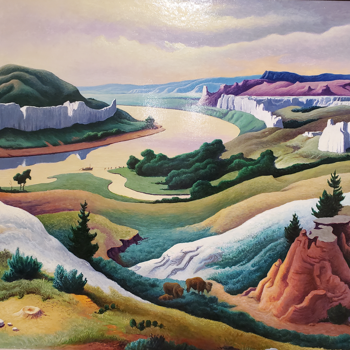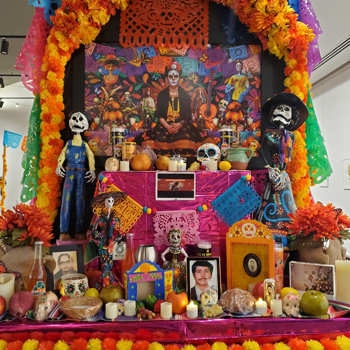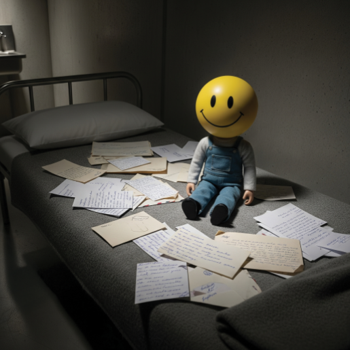Caroline
 Artwork by DALL·E
Artwork by DALL·E
Leonard and I had laughed hard first, then with trepidation, when Caroline, at five years old and in bright blue shorts with her grandfather’s orange flannel, told us she had just phoned the poison control hotline twice. She had introduced herself for the sake of efficiency, she had said, for when an emergency came. Then she called back to tell the man on the phone that her birthday was in eighty-four days and her wish would be to never die from poison. So, in exactly twelve weeks, she “probably would never need to call again.”“I told him also about everything I can see from my window,” she said, “because I was thinking about it and he was listening.” Leonard moved the phone from the desk where he worked to a bookshelf she could not reach.
“No more calls, pull it down by the chord if the bad guys come. Call and be brave,” she nodded obediently when he told her. It seemed he and Caroline had an unspoken understanding of who these bad guys were.
That evening I called Drew Reynolds, principal of Cambria-Fern Elementary School, to question whether there had been any discussion in Caroline’s classroom that would have brought her to make such a call. Drew Reynolds told me that her class was studying the moon and suggested that Caroline might feel small, he had said, relative to the large universe. “Call and be brave.”
In fact Caroline did not fear how tiny she was; she was afraid she would be unable to see everything, paltry or elegant, the universe had before she was poisoned, or kidnapped in her sleep and left to rot in a swamp, or eaten by a coyote.
***
That evening, a few hours after hanging up on Drew Reynolds, I died. Sudden neurological death; a subarachnoid hemorrhage meant my brain’s membrane was weak and a blood vessel had burst and I suffered an aneurysm and died instantly as half the people who experience a subarachnoid hemorrhage do. And when I awoke from the cloud of aquamarine stippling for the first time, I was suspended twenty feet in the air.
It was freakishly foreign to be in a body the size of my human heart but even there in my inaugural flight was a satisfaction which rang as if an old man were in my bones playing a grand organ; I had never been a towhee before.
As a child my best dream was when I willed my feet off the ground and soared, taking steps on thick air and examining shingled roofs as a toddler would taking off in an airplane for the first time, but even in this dream I had toes with hair on them and a heavy belly – feathers and gusts of wind did not need to be considered. Now I weighed 1.6 ounces and had a much wider field of vision. I found I flew better the less I thought.
A deep black pendulum of stringy, coarse twine caught my eye and then I wanted to cry. I desperately examined the strands straying from the twine – the rope swung fast and, steady inside the sharp breeze, a glimpse of two eyes found mine.
Caroline had, of course, come into the world screaming, but curiously her eyes had not housed the confused frustration one expects in a newborn’s first glances and she instead looked at me with the impression of a massive grin. Caroline’s eyes were an eerie green, bright as grass coated in dew under an early sun. Catching the light she had feathers in her irises and always a fixed squint that made her look elated even when her cheeks drooped and she was wailing.
Now those eyes followed a small bird with brown feathers and a soft orange stomach against the hard blue sky, the sky that seems perpetually more vibrant the younger its viewer.
She paused the motions of her four-square game and followed me as I dove, and I chirped because I could not cry out to her long, dark braid that bounced behind her, or to the legs and face that looked how mine once did. Caroline squinted but the sun was behind her so she was questioning me. With her head tilted she silently asked what all I could see. She asked if I was frightened or if I was joyful, wondered if I calculated each time my wings flapped, and wondered if I, orange and twittering, was a genius.
In my small, fragile body I watched her hair swing until I was taken from the sky; in that time of pint-sized existence I thought about growing.
***
Caroline’s grandmother, my mother, had once told me a riddle: a boy was trapped in a room with no doors or windows, only a piece of chalk. He was meant to break the chalk in half. “Two halves make a whole,” my mother had said, “and he can climb through the hole to safety.” I used to feel quite like that boy, desperately trying to reach life as I knew it through an imaginary tunnel. Now I am not so nostalgic.
I want to clarify here that the world moves me and I do not move it.
I spend most of my time in a mist that holds me like a womb. While I have no precautionary control over what I may be in Caroline’s world, I have never felt anything but gratitude for where I am thrown. There is an umbilical cord between us that I know is tough and cannot be cut.
After the towhee, I was fortunate to be weaseled in Caroline’s ceiling from time to time, where I sensed that she felt like an inchworm on a large, blank plane. I liked to watch her sleep – she covered herself in a myriad of blankets each night, even when the air was hot. It was comforters, not Caroline’s flesh, that I watched rise and fall as her dragonfly light bulbs twinkled around her window.
She was a scared child but I never prayed for her safety – danger seemed remote in the same way that living in Cambria we did not need to worry about a tornado. And although it pained me to watch her cry from a skinned knee or when Leonard made her feel small, I saw her plucking various hairs of comedy and sorrow from the things in her orbit and with that, I am proud to declare I do not fear for her. I have prayed she will see what I see.
Sometimes she would stir at an odd hour of the night. Sometimes she would emerge from her fortress and, making herself tiny at the windowsill, gaze into blackness and the faint silhouette of a Japanese Maple. Caroline never outgrew this habit, although, by the time she was thirteen, she did not need to fall asleep to wake up. She would sit so still for hours, staring.
***
As a bird I flew swiftly, watching over Caroline like an old god, but then I was stuck in a plastic cylinder that smelled like bleach; to be inanimate could be challenging. I had a fixed view in front of me; a black slab with some poor graffiti promoting the skank dance and a band called “Arthur’s Barf.” I hoped for a cosmic mistake, that Caroline was not in this place.
Because I was a bottle of Clorox wipes and not a living being, and because I could not leave by my own will, I stared into the hypnotic tile floor of the greasy bathroom and waited to hear Caroline. I assumed she would be out of sight, at the front of the venue on stage; it had been a while since I had seen her and longer since I had been in her ceiling, but the last thing I could remember was her slowly strumming “Mrs. Robinson” at the window sill. I sunk backward, dreaming, into the memory of her sound.
Caroline, however, was not performing.
Two pairs of black boots tripped over one another, startling me and I watched through the gap in the stall. Caroline creaked open the door first and fell to her knees. The Clorox bottle moved, out of my being alarmed or the force of her collapse I am not sure. She had cut her hair into a bob and it was almost completely flat. Only for a moment did I catch the green flash of her eyes, still grinning, but I could see she was attempting to mask an uncertain disorientation. On the floor with her hands guiding her choppy movement, she crawled exactly as she had as an infant. Another girl came in and started rubbing her back.
A devilish noise erupted from Caroline’s throat and she vomited into the toilet that had a cracked lid and only half a seat – the only time I had wished again to be alive, to be back in my flab and bones and have feet I could run on. To the sound of my daughter’s gagging I pictured myself running from a house with smoke drifting from its chimney. I ran barefoot through brush and snapped twigs with my toes and looked only ahead at pines and eucalyptus. There was an aquatic rumble and I ran to follow it in hopes of downing her coughs.
When I got to the river it sounded mechanical – her friend had flushed and she was gone.
Nothing about the bathroom had changed aside from the addition of a beer can with a straw in it. Leonard’s sister drank that way. A man, no younger than fifty, came into the stall next.
I saw his high pants, I saw his belt, and I saw the posture I have seen a thousand times. These men work in portables and basement offices; these men turn gray after their sons. There are things such as these men that can ground even a ghost.
***
Caroline was in the back seat of her best friend’s mother’s white 1992 Ford Mustang, driving along the Mojave to Salt Lake City; her arms thick and her hair in a hefty bun tied by an orange bow. I, gazing from the trunk, was hypnotized by her wide, fine, freckled shoulders. When she turned her eyes grinned and I saw her face had new smile lines and her forehead a few scattered wrinkles.
Over the radio was a song I did not recognize, but the lyric “If you see her, say hello,” caused Caroline’s friend and mother to look to each other at the same time, with pity. Behind them, Caroline saw this too. I could tell by the way her vertebrae stacked themselves a little tighter that there would be a new sparkle in her beaming shamrock lenses.
In the sad smile the mother and daughter shared, in the implied consolation of having left both of their lovers without any reservations, who had allowed them to drive off into the desert without reluctance, was Caroline, leaning forward between the passenger and driver seats so that her head was between the women as her back was arched in a way I myself had been incapable of until twenty-two. Caroline was eighteen and something whispered in my ear that she was hungry; hungry for the unspoken, the energy that radiated between the souls beside her; the ones that had been loved; they had been lost and they had been missed. She leaned desperately, to taste the strength that kept them silent, the power of their chests and hearts that I watched Caroline learn how to open in herself but did not know yet how to announce.
The cold cloud of my empty existence began to flood the trunk of the rumbling Mustang; the curtains of the moment in front of me were closing. As I drew back into the dimension of stupor not shared with my daughter, I imagined a rusting pair of bright red scissors slicing her seatbelt and her body being flung into the affection and attrition spewed from the car’s stereo still foreign to her. There was love I could send her but it would not be organic; I wanted her swallowed.
***
When she was learning to walk my most persistent worry was, of course, that I would lose her. She had wandered off in a park to make conversation – noise and sniffles and lots of laughter at nothing – with a young man reading alone at a picnic bench, and I was afraid I would lose her to someone she found more exciting.
Now I know she was already lost to the world. When she ran to me and fell asleep in my arms and cried in my bed late at night because she felt stupid she did not belong to me but to the grass her feet touched and the love and the idiocracy. Her young desires for adventure – those elegant or paltry things existed always – left a wound that was the motor to her heart and the unstoppable craving to relieve the exclusion from understanding she felt tainted by was what lit Caroline’s eyes. Held by the world, scared and loving it, she has always been searching with darting eyes, and yes she has found it and yes she will always be looking.
Caroline was fantastically curious from the start, and her curiosity always soft. I still remember my fingertips feeling it woven into the burgundy threads of her wool socks and there is a summer scene I replay constantly, watching the delicacy with which she stepped around the neighbor’s hopscotch to investigate the funny way a child wrote his seven’s.





